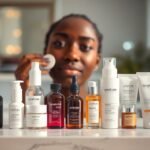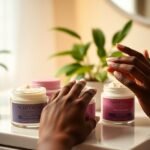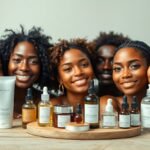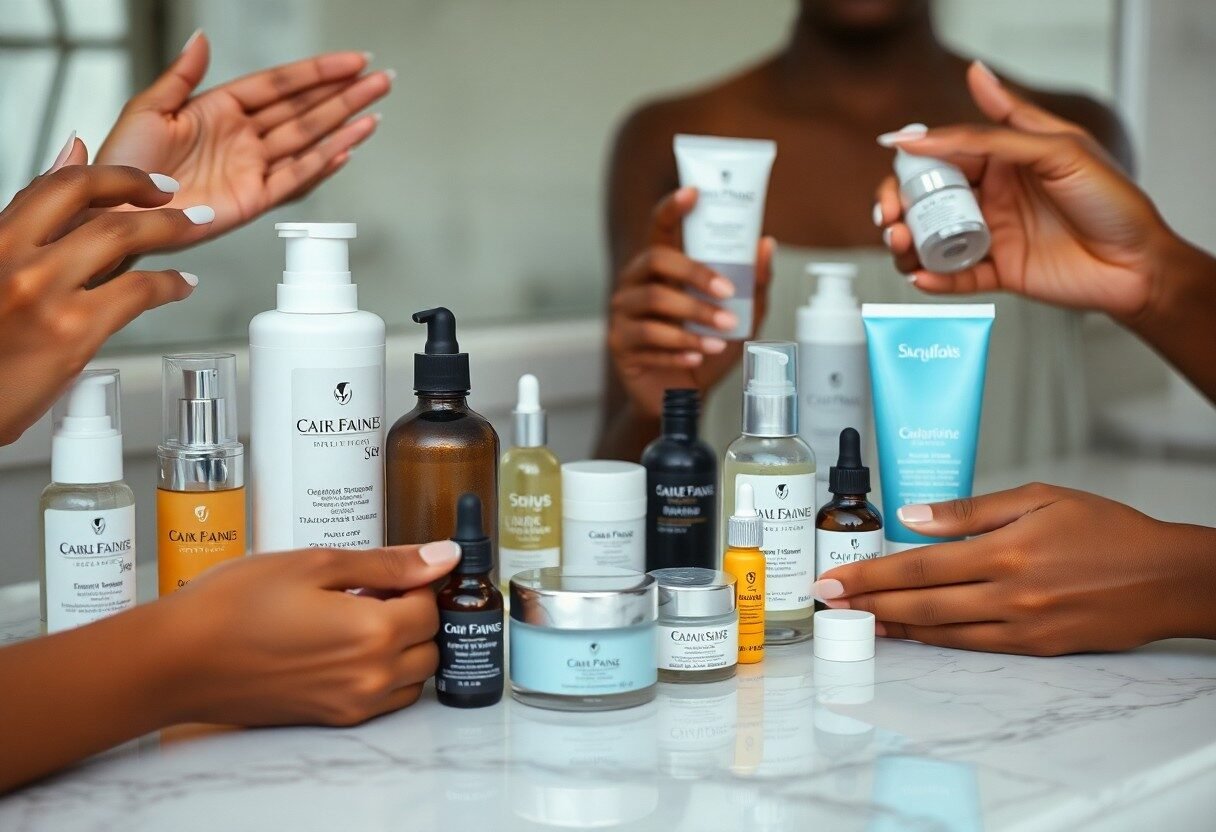
Just like any other skin type, darker skin tones need a personalized skincare regimen to thrive. I understand that finding the right products and building an effective routine can be challenging, but I’m here to help you navigate it. It’s crucial to choose products that not only address common concerns like hyperpigmentation but also protect against sun damage. In this guide, I’ll share expert tips and must-know ingredients that will empower you to enhance your natural beauty effectively, ensuring your skin remains vibrant and healthy.
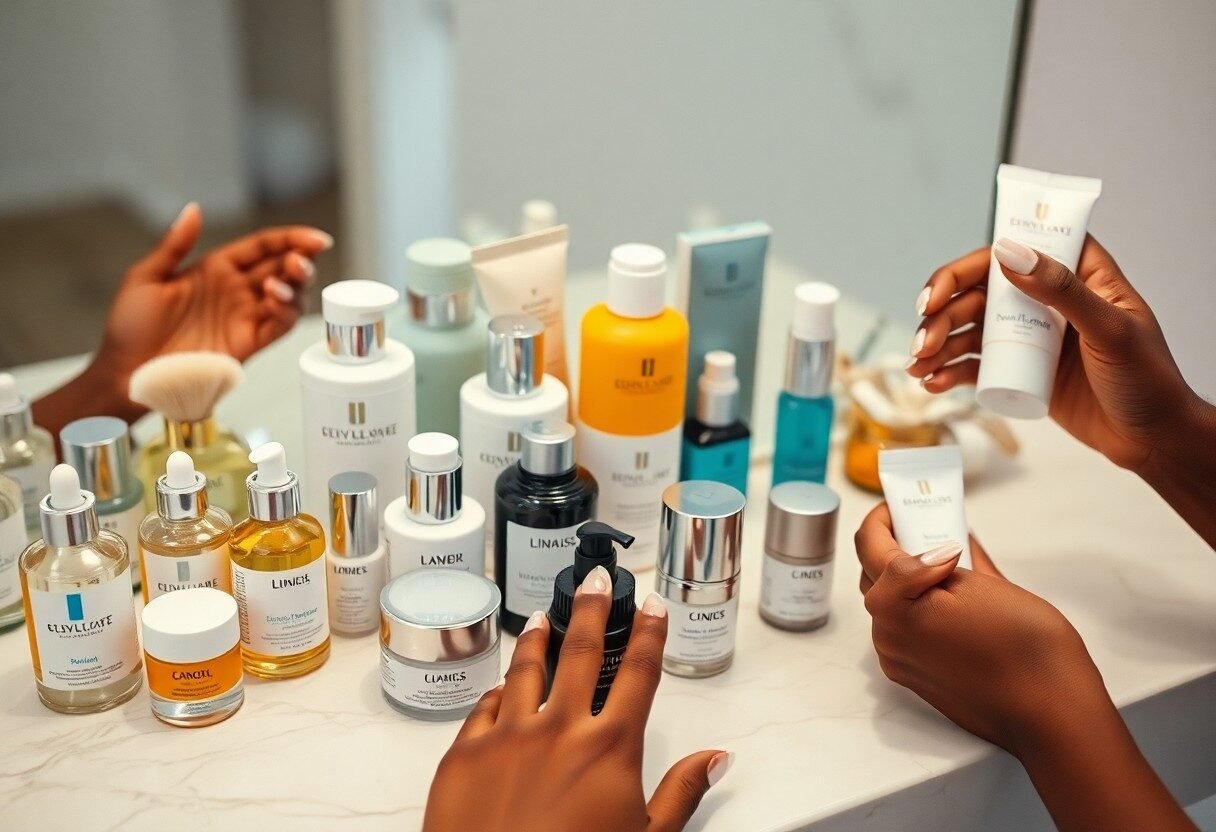
Key Takeaways:
- Identify your skin type to tailor products specifically for oily, dry, or combination skin.
- Choose products with brightening ingredients like Vitamin C, licorice root, and niacinamide to enhance radiance.
- Include a broad-spectrum sunscreen to protect against UV damage, which can lead to hyperpigmentation.
- Incorporate exfoliation into your routine to help remove dead skin cells and promote even skin tone.
- Hydration is vital; consider moisturizers with hyaluronic acid or shea butter for added nourishment.
- Patch test new products to minimize the risk of irritation or adverse reactions.
- Consult with a dermatologist for personalized advice, especially for concerns like hyperpigmentation or acne.
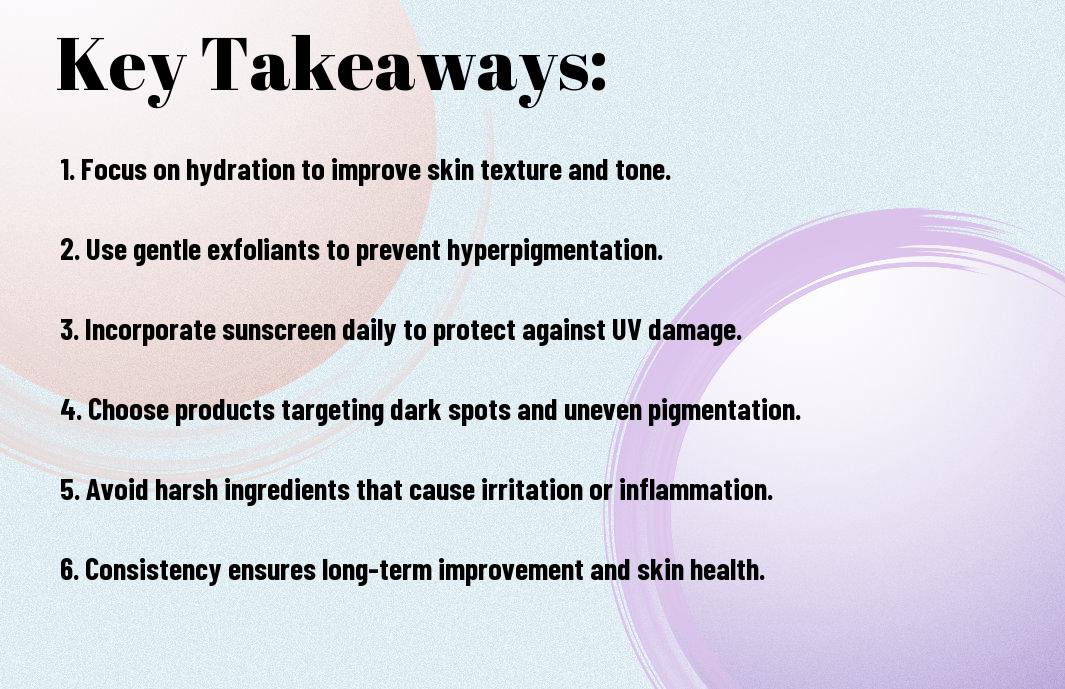
The Unique Characteristics of Darker Skin Tones
Melanin Production and Skin Resilience
Darker skin tones typically have higher levels of melanin, which grants increased protection against UV radiation. This natural barrier contributes to greater skin resilience, making darker skin generally less prone to sunburn. However, this does not mean that darker skin is immune to sun damage; complications like hyperpigmentation can still occur with prolonged exposure to the sun without proper protection.
Common Concerns Specific to Darker Skin
While darker skin tones have their advantages, they also come with unique challenges. Issues such as hyperpigmentation, post-inflammatory erythema, and the risk of keloids are more prevalent in individuals with darker skin. These concerns often require specific treatments and ingredients that cater to these conditions.
Hyperpigmentation, characterized by uneven skin tone, can manifest due to several factors like acne, sun exposure, or hormonal changes. Individuals with darker skin produce more melanin in response to inflammation or irritants, leading to darker spots. Additionally, the risk of developing keloids—excess scar tissue that forms after wounds heal—is significantly higher. Understanding these specific concerns allows you to focus on products that not only address these issues but also promote a balanced and healthy complexion.
Ingredients That Shine for Melanin-Rich Skin
The Power of Natural Oils and Butters
Natural oils and butters offer a wealth of benefits for melanin-rich skin. Ingredients like shea butter and coconut oil provide deep hydration while supporting your skin’s barrier function. They help maintain moisture levels and protect against environmental stressors. Additionally, oils such as jojoba and argan not only nourish but also help balance oil production, making them suitable for various skin types.
Active Ingredients: What Works Best
Incorporating specific active ingredients can significantly enhance the efficacy of your skincare routine. Ingredients like vitamin C and niacinamide are exceptional for brightening dark spots and uneven skin tone. For those battling hyperpigmentation, products with kojic acid and alpha arbutin can deliver impressive results without irritating your skin.
In my experience, targeting hyperpigmentation takes a multi-faceted approach. For instance, combining vitamin C in the morning with niacinamide in the evening can create a powerful synergy that helps combat dark spots over time. I’ve found that retinol also works wonders for cell turnover, revealing a brighter complexion while fading discoloration. Remember to start gradually with retinol to minimize potential irritation, especially if you have sensitive skin.
Building Blocks of an Effective Skincare Routine
Cleansing: Choosing the Right Formula
For melanin-rich skin, selecting a gentle yet effective cleanser is key. Look for formulations that cater to your skin type, ideally those that are sulfate-free and enriched with natural ingredients. Creamy cleansers can provide hydration, while gel-based options work well for oilier skin. The right cleanser will remove impurities without stripping necessary moisture, maintaining your skin’s natural balance.
Exfoliation: Frequency and Method Considerations
Exfoliating on a regular basis enhances cell turnover and can help reduce dark spots that are common for those with darker skin tones. I recommend exfoliating 1-2 times per week using either mechanical scrubs or chemical exfoliants with alpha- or beta-hydroxy acids. These gentle options minimize irritation and promote a brighter complexion.
While mechanical scrubs can give immediate results, they may be too harsh if used too frequently. Instead, integrating chemical exfoliants, like glycolic acid, may provide a more sustainable approach that penetrates deeper into the skin, effectively removing dead skin cells without the abrasive effects. Your skin will appreciate the balance achieved by alternating methods, potentially leading to improved texture and even skin tone over time.
Moisturization: Hydration and Protection
Locking in moisture is necessary for maintaining the health of darker skin tones. Look for moisturizers containing ingredients like hyaluronic acid, ceramides, and natural oils, as these can provide hydration while also forming a protective barrier. Lightweight lotions often suffice for daytime use, while richer creams are perfect for nighttime repair.
Incorporating a moisturizer tailored to your skin’s needs can prevent dryness, which is often overlooked but can lead to dullness or increased sensitivity. Ensure you apply your moisturizer while your skin is still damp, as this can help to lock in hydration more effectively. Regular use of a nutrient-rich moisturizer not only hydrates, but also fortifies your skin against environmental stressors. Better hydration can sometimes minimize the appearance of hyperpigmentation, giving your skin a more even and luminous appearance over time.
Targeted Treatments for Multifaceted Needs
Hyperpigmentation: Solutions and Best Practices
Hyperpigmentation can be a persistent challenge for darker skin tones, but effective solutions exist. I recommend incorporating ingredients like vitamin C, which brightens the skin and evens out tone, along with retinoids, which promote cell turnover. Regular use of SPF is non-negotiable as it protects against further pigmentation caused by sun exposure.
Acne and Scarring: Tailored Approaches
Addressing acne in darker skin requires a nuanced understanding of potential scarring. I find that using salicylic acid or benzoyl peroxide can be effective for treating active breakouts. To minimize the risk of post-inflammatory hyperpigmentation, gentle exfoliation with alpha hydroxy acids offers a way to refine skin texture without irritation.
Acne scars pose a particular concern due to the risk of hyperpigmentation, making preventative measures vital. I like to integrate exfoliating masks into my routine once or twice a week to help slough off dead skin cells and encourage regeneration. Additionally, professional treatments like chemical peels or microneedling can work wonders in reducing the appearance of scars, as they stimulate collagen production and promote a more even skin surface. Always consult with a dermatologist before starting any targeted treatment, especially if your skin is showing sensitivity or reactions to new products.
Sun Protection Myths and Realities
Why SPF is Crucial for Darker Skin
I often hear the misconception that darker skin tones don’t need as much sun protection because they have more melanin. While melanin does provide some defense against UVA and UVB rays, it doesn’t make you immune to skin damage. Even individuals with darker skin can experience sunburn, skin aging, and an increased risk of skin cancer. Daily application of SPF isn’t just for fair-skinned individuals; it’s a necessary step regardless of your skin tone. Protecting your skin adequately can help lower the risk of hyperpigmentation and other long-term damage.
Recommended Products and Application Techniques
Choosing the right SPF can be daunting, but I advocate for a broad-spectrum sunscreen with at least SPF 30 to ensure full protection against harmful rays. Look for products formulated with physical blockers like zinc oxide or titanium dioxide, as they sit on the skin’s surface to reflect UV rays. When applying, aim for a generous amount—about two fingers’ worth for your face alone—and be sure to reapply every two hours, or more often if sweating or swimming.
As far as application techniques, spreading the product evenly is key to achieving optimal protection. I like to apply sunscreen to clean, dry skin after my moisturizer. This ensures that the SPF maintains its efficacy. Don’t forget areas like your ears, neck, and the top of your hands, which often get overlooked. Incorporating a tinted sunscreen can also be a game changer, offering a hint of color while providing necessary protection without leaving a white cast. Finding the right products and applying them correctly will give your skin the defense it needs against the sun’s rays.
Seasonal Adjustments: Adapting Your Routine
Summer Needs vs. Winter Care
Summer typically demands lighter, oil-free products to combat excess sweat and humidity, while winter calls for richer creams that hydrate and protect your skin from dry, cold air. In hot months, I switch to gel-based moisturizers and lightweight sunscreens that offer broad-spectrum protection without feeling heavy. Conversely, as temperatures drop, I incorporate thicker lotions with ingredients like shea butter and hyaluronic acid to lock in moisture and restore hydration lost to dry environments.
Travel Considerations and Outdoor Activities
Traveling can introduce unique challenges to your skincare regimen, especially when engaging in outdoor activities. I make it a point to pack travel-sized necessarys, including sunscreen, to maintain my skincare routine no matter my destination. If you’re planning a beach trip or a hike, ensure you’ve selected non-comedogenic products that can withstand sweat while keeping your skin protected and healthy.
Adapting your routine for travel means being mindful of potentially harsh climates and activities that could aggravate your skin. For example, a tropical trip requires a focus on sun protection, so a broad-spectrum SPF is non-negotiable. I also prioritize lightweight, breathable formulations that can handle the humidity. If you plan on engaging in sports or outdoor adventures, use products with sweat-resistant properties to prevent breakouts while ensuring your skin stays protected. A robust travel kit that addresses these needs can be your best ally in maintaining skin health on the go.
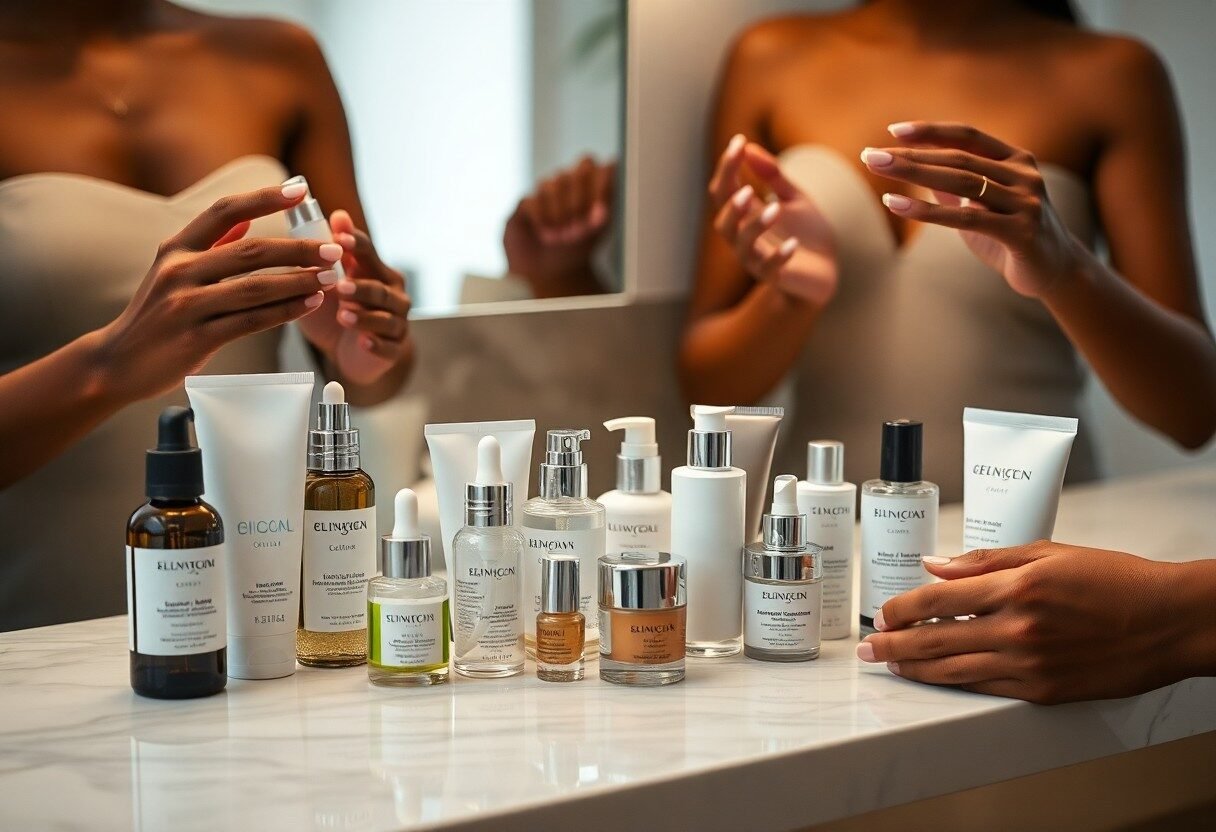
Holistic Approaches to Skincare
Nutrition’s Role in Skin Health
Your skin reflects what you consume, so adopting a balanced diet rich in vitamins and antioxidants can elevate your skincare game. Incorporating foods such as leafy greens, nuts, and berries nourishes the skin from within, promoting a vibrant, even tone. I often emphasize that hydration also plays a vital part; drinking plenty of water keeps your skin supple and radiant. The benefits extend beyond superficial appearances, as what you eat can significantly influence your skin’s healing and rejuvenation processes.
Lifestyle Factors: Sleep, Stress, and More
Quality sleep is vital for skin regeneration, while managing stress levels can help reduce breakouts and support overall skin vitality. I often encourage practices like meditation or gentle yoga, which have been shown to decrease cortisol levels and promote relaxation, leading to clearer skin. The interplay of these lifestyle factors can’t be overstated; inadequate sleep and heightened stress can negate even the best topical treatments.
- Quality sleep boosts skin healing
- Stress management reduces inflammation
- Exercise improves blood circulation
- Mindfulness practices promote a positive glow
- Routine consistency supports cumulative results
For optimal skin health, I recommend establishing a consistent sleep schedule to ensure your body can repair and renew itself. Incorporating 7-9 hours of rest will enhance not only your skin’s appearance but also your overall well-being. Pair this with regular exercise, as it increases blood flow and helps detoxify through sweat. The synergy between sleep, exercise, and stress reduction reinforces that your skin’s health is as much an inside job as it is an outside one.
- Regular exercise aids in skin detoxification
- Hydration is vital for elasticity
- Mindfulness techniques enhance relaxation
- Skin routine adherence brings lasting effects
- Balanced lifestyle fosters overall health
The Importance of Consistency and Patience
Setting Realistic Expectations
Starting a skincare regimen is not a quick fix; I’ve learned that patience is necessary. You should expect to see noticeable changes within 4 to 6 weeks, depending on your skin’s unique condition and the products being used. Major transformations, such as fading dark spots or improving texture, often take several months. By setting realistic expectations, you can avoid frustration and stay committed to your routine.
Tracking Progress and Adjustments
Documenting your skincare journey provides insights into what works and what doesn’t. Keeping a skincare journal, for instance, helps you track any changes in your skin’s appearance and reactions to products over time. Take photos every few weeks to visually assess your progress and adjust your routine based on your findings.
Tracking progress involves not just visual observations but also paying attention to how your skin feels. I often jot down notes about any irritation, breakouts, or areas of improvement. This record allows you to pinpoint which products contribute positively or negatively. When something isn’t working, don’t hesitate to experiment with alternative options. Note, each person’s skin is different; what helped a friend might not be suitable for you. Adaptability will ensure you’re on the right path to achieving healthier skin.
Final Words
With this in mind, I encourage you to embrace the uniqueness of your darker skin tone by tailoring your skincare regimen accordingly. It’s important to focus on hydration and protection, as well as targeting specific concerns such as hyperpigmentation. You can achieve radiant skin by incorporating products enriched with antioxidants, vitamins, and SPF. By understanding your skin’s needs and consistently applying the right products, you’ll enhance your natural beauty and build a routine that keeps your skin healthy and vibrant.
FAQ
Q1: What are the unique skincare needs of darker skin tones?
A1: Darker skin tones often possess more melanin, which provides a natural level of protection against UV damage. However, they can also be more prone to hyperpigmentation, uneven skin tone, and certain skin conditions like acne. It’s necessary to focus on products that address these specific concerns while also providing hydration and nourishment.
Q2: How often should I exfoliate if I have darker skin?
A2: Exfoliation is key to preventing clogged pores and promoting skin renewal. For darker skin, it is advisable to exfoliate 1-2 times a week, using both physical and chemical exfoliants. However, it’s necessary to monitor your skin’s response and adjust accordingly. Gentle exfoliation helps prevent irritation and reduces the risk of hyperpigmentation.
Q3: Are there specific ingredients that are beneficial for darker skin tones?
A3: Yes, certain ingredients can be particularly beneficial. Look for products containing vitamin C, which helps brighten and even out skin tone, as well as niacinamide, which can improve skin texture and tone. Ingredients like hyaluronic acid and glycerin provide hydration, while salicylic acid can help with acne-prone skin.
Q4: How can I protect my skin from hyperpigmentation?
A4: To protect against hyperpigmentation, daily sunscreen use is necessary, even on cloudy days. Choose a broad-spectrum SPF 30 or higher. Additionally, consider incorporating antioxidants into your regimen to combat free radical damage and help skin recover from discoloration caused by sun exposure or acne.
Q5: Should I use different products for day and night skincare routines?
A5: Yes, it can be beneficial to have separate products for day and night. During the day, focus on hydration and sun protection, using moisturizers and sunscreens. At night, you can incorporate more active ingredients like retinoids or exfoliants, which help with skin cell turnover and rejuvenation while you sleep.
Q6: How important is hydration for darker skin tones?
A6: Hydration is vital for all skin types, but darker skin tones often require extra moisture to maintain balance and combat dullness. Look for rich creams or oils that cater to deeper skin tones, as these can help lock in moisture and provide a healthy glow. Ingredients such as shea butter, jojoba oil, or aloe vera can be particularly beneficial.
Q7: Can lifestyle factors affect the effectiveness of my skincare regimen?
A7: Absolutely. Factors like diet, hydration, sleep, and stress can significantly impact your skin’s appearance and health. A balanced diet rich in vitamins and minerals, adequate water intake, sufficient sleep, and effective stress management can enhance the outcomes of your skincare routine and boost your skin’s natural radiance.
